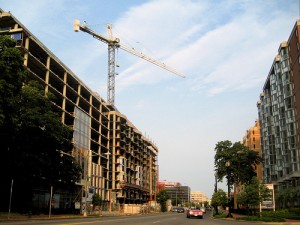Now Reading: Sociology in My Neighborhood
Excuse me, while I nerd out to an exciting new blog– Sociology in My Neighborhood: DC Ward Six. Penned (typed?) by a Professor of Sociology at George Mason University, the site explores the same issues DCentric does, albeit on a hyperlocal level. Here’s part of a post about whether segregation is caused by racism:
Generally, sociologists study whether people are segregated because of personal choice, economic reasons, or racial discrimination. Economic factors are definitely a big reason, especially when we look at housing costs, but racial discrimination still exists. Let’s take a look at sociologists Michael O. Emerson, Karen J. Chai, and George Yancey’s “Does Race Matter in Residential Segregation? Exploring the Preferences of White Americans.”…
Controlling for all sorts of variables, Emerson and his colleagues found that whites are neutral about the likelihood of buying the house if the neighborhood is 10-15% black. Above 15% black, whites say that they would not likely buy the house. They write, “Our findings suggest a low probability of whites moving to neighborhoods with anything but a token black population, even after controlling for the reasons they typically give for avoiding residing with African Americans.” The reasons that whites typically give are crime and declining property values. So, even when the neighborhood offered has little crime and good property values, whites still choose not to live in those with 15% or more black residents.
According to another sociologist Camille Charles, “Blacks, Hispanics, and Asians all appear to want both meaningful integration and a substantial coethnic presence,” while whites exhibit the strongest preference for same-race neighbors. This explains white flight. As whites with a lower preference for black neighbors move out of a neighborhood, more blacks might move in, thus triggering other whites to move. Whites do not have the same preferences in regards to Asians and Hispanics, though all these groups are segregated too. So, whites avoid areas with nontoken percentages of Asians or Hispanics not due to race, but due to other reasons.
This does not bode well for our future:
Even more disturbingly, whites with children under 18 live in areas with 20% fewer blacks than do the whites without children under 18. Black and white children will find themselves even more segregated from each other than black and white adults are.
Why do whites want to live in white neighborhoods, even when all the reasons they usually give for avoiding blacks are removed (crime and declining property values)? As Camille Charles writes, residential segregation has devastating consequences for all blacks, irrespective of socioeconomic status, and later continues, “Whites use segregation to maintain social distance, and therefore, present-day residential segregation…is best understood as emanating from structural forces [economic forces] tied to racial prejudice and discrimination that preserve the relative status advantages of whites.” Sociologists call this opportunity hoarding.
By the way, if you know of other blogs or Twitter feeds with similar, relevant content, PLEASE feel free to let me know. Finding this blog today made me wonder about what else I’m missing!
-
http://anthroarchivist.wordpress.com/ Rose
-
Guest
-
Singularity2050
-
Singularity2050
-
Singularity2050
-
Jbockman
-
Golden Silence






